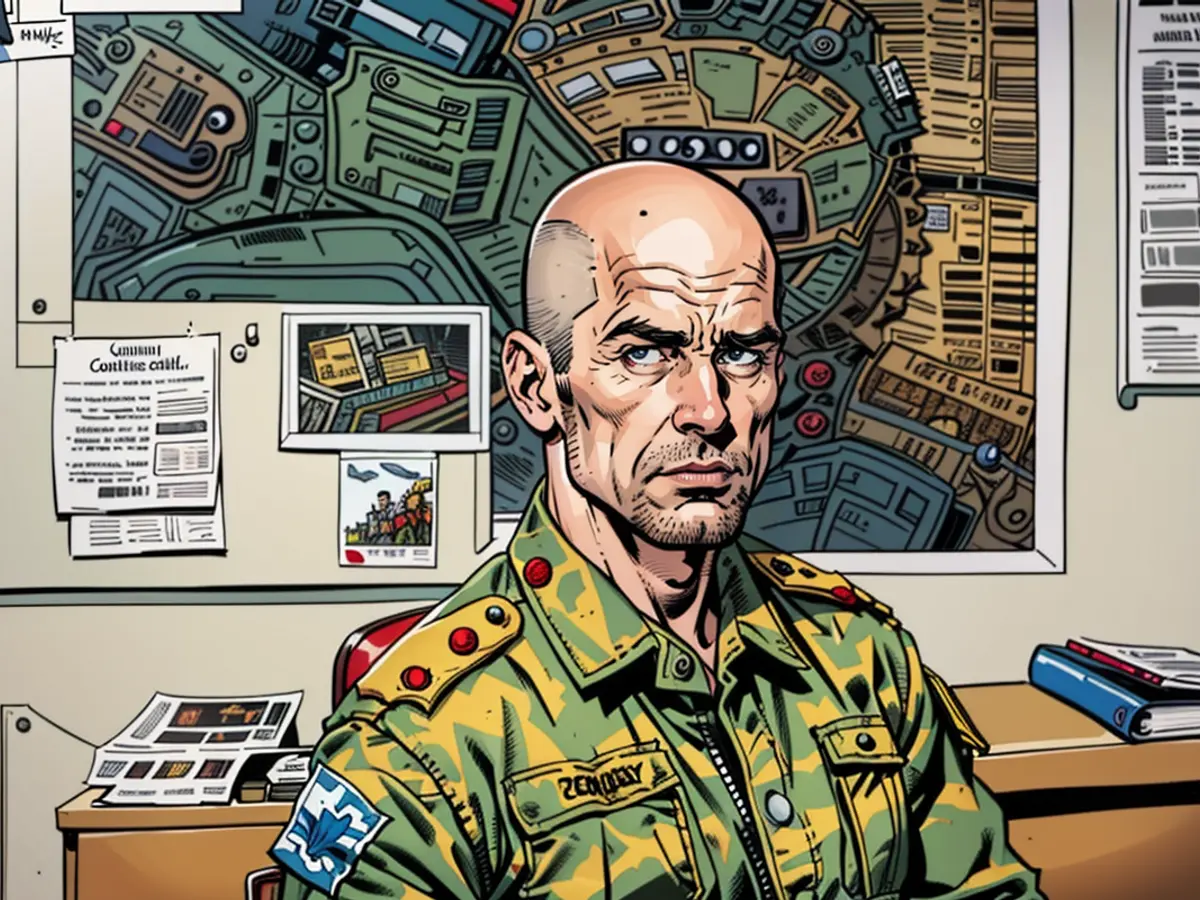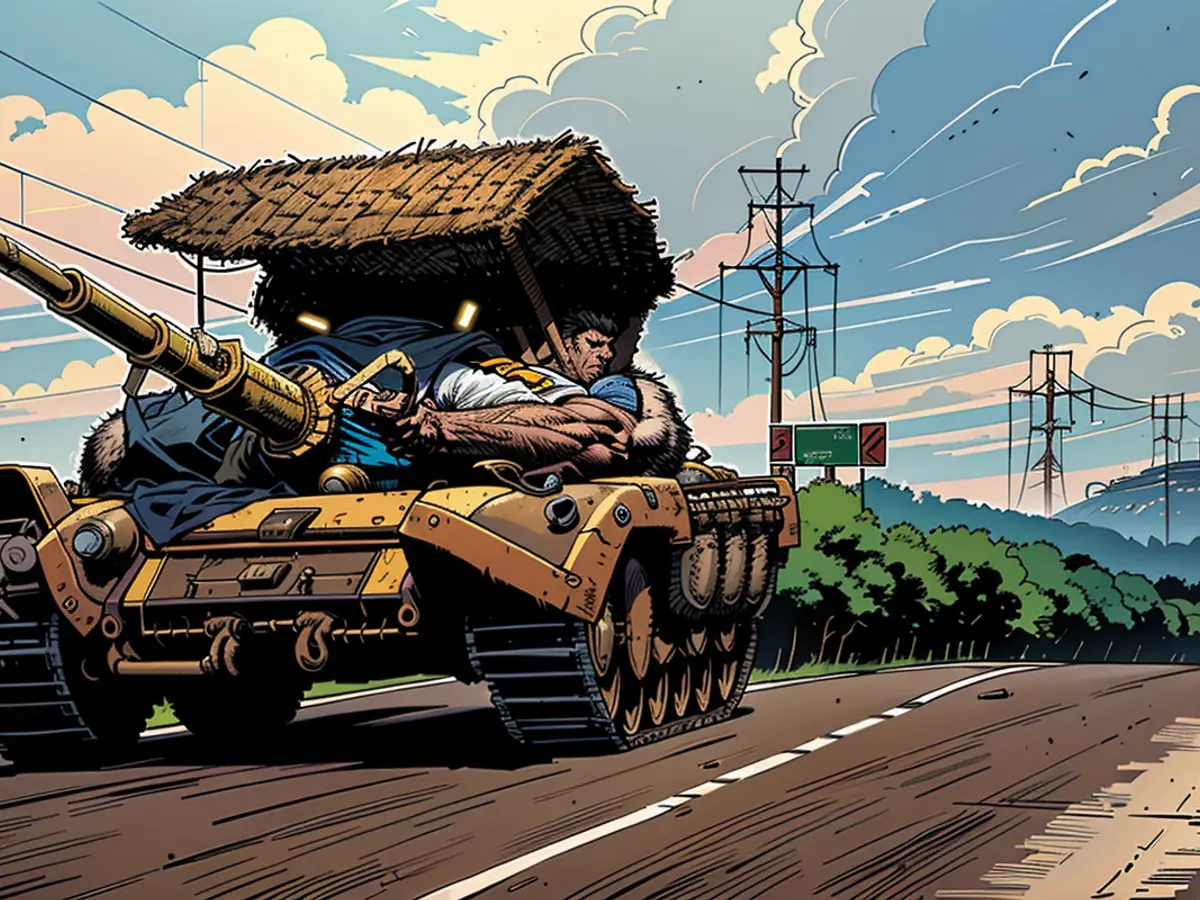"Putin will not tolerate Ukrainian troops in the Kursk region"
Ukrainian troops continue to fight deep into Russian territory. Holding the areas captured in the Kursk region will be extremely difficult, warns Markus Reisner on ntv.de, who also warns of an overextension of the Ukrainian front. Meanwhile, Russia continues to advance in the Donbass. Reisner sees the key front city of Chassiv Yar on the verge of falling to the Russians.
ntv.de: Oberst Reisner, for more than ten days, Ukrainian soldiers have been fighting on Russian territory near Kursk. How is the offensive developing?
Markus Reisner: Part of the forces from a total of three Ukrainian brigades have advanced up to nearly 15 kilometers into Russian territory and have taken possession of land southwest of Kursk. The Ukraine is trying, especially with light elements and special forces, to push as far forward as possible in the last 48 hours. The main routes are avoided because they are already under observation by Russian drones and are being targeted.
As always in this war, the information from both sides must be evaluated with great caution. How do you interpret the images from the Ukrainian side?
The images and videos of Ukrainian soldiers from the villages they have taken serve mainly for targeted information warfare. This also applies to images of destroyed Russian columns and captured Russian soldiers. The aim is to create a dynamic similar to that seen in the Kharkiv area in the fall of 2022, when Russian soldiers thought they were being overwhelmed and fled in panic. However, such a tactic only works in the first 72 hours of a surprise attack, and that window of opportunity has now passed.
The attack also surprised many Western analysts. Has the strategic goal of Kyiv behind the offensive become clearer?
The strategic goal of Ukraine is to get out of negative headlines in the short term and boost the morale of its own population. In the medium term, it is trying to tie up Russian forces redeployed from the Donbass and thus break the momentum of the Russians there. In the long term, Ukraine's goal is to improve its position on the battlefield in order to achieve a more favorable negotiating position. The situation in Ukraine must also be seen in the context of a renewed escalation in the Middle East. If there is indeed an Iranian retaliatory strike against Israel, this will determine the headlines. Ukraine needs attention and media presence to continue receiving support, especially from the USA.
What challenges do the Ukrainians now face in Kursk?
Ukraine must hold the militarily captured territory, which means it must establish sustainable defenses. The main risk for Ukraine is that precious reserves needed in the Donbass are now being drawn into the Kursk area. To hold the gained territory southwest of Kursk, Ukraine must continuously send in more troops and supply them with soldiers, equipment, weapons, and ammunition. The soldiers must also build defensive positions, all under constant Russian threat, especially from the air.
What does this mean for Ukraine?
If Ukraine's calculations do not succeed in the next few days and weeks, it will have to supply an even longer front. Russia, on the other hand, has up to 700,000 men available by the end of the year, according to statements from the Ukrainian general staff. This means Russia can continue the attrition war despite the setback in Kursk. Ukraine risks overextending itself with its offensive in Kursk.
What are the countermeasures of the Russian army in Kursk?
(No direct translation provided in the original text)
It is recognized that Russian troops are consolidating and reinforcements are arriving continuously. Russia has been trying for 48 hours to stabilize the front south-west of Kursk. The Russian forces are slowly pushing troops towards the Ukrainian attack points, using Lancet and First-Person-View drones, artillery, rocket launchers, and glide bombs, primarily targeting Ukrainian heavy equipment. The Ukrainians are trying to avoid Russian reconnaissance by moving into forested areas, avoiding main axes, and advancing wherever possible. In forested areas, the Russians are using Ka-52 and Mi-28 combat helicopters with night vision devices and thermal imaging equipment to locate the Ukrainians, resulting in repeated shootdowns of such combat helicopters.
Is Kyiv's calculation correct that Russia must withdraw forces from Ukrainian territories to retake Kursk?
This depends on the origin of the reinforcements. It is not yet clear if they are coming from the Donbass. Based on the tactical markings of Russian vehicles, they can be attributed to the operational grouping "SEVER" (North). Therefore, the Russians have withdrawn forces from the area north of Kharkiv. Additionally, up to two squadrons of Su-34 fighter aircraft are likely involved, as indicated by the increased use of glide bombs southwest of Kursk. To prevent these drops, Ukraine would need to deploy medium-range air defense systems or its new Western fighter jets, such as the F-16. Putin will not tolerate Ukrainian troops in the Kursk area.
Therefore, you are not observing any easing of Russian offensives in the Donbass and the southern occupied territories?
The momentum of the Russian attack in the Donbass remains strong, as shown by the continued intensity of the attacks, which even seems to have increased at some hotspots. In the last few days, the Russians have taken more villages west of Ocheretyne and Torez despite heavy losses. Additionally, the Russians have advanced over the Donbass Canal and established a bridgehead at Chassiv Yar. If Russia succeeds in expanding this bridgehead, Chassiv Yar could fall. It appears that the Ukrainians have not been able to maintain their strong position on the western bank of the canal. Further Russian advances are reported in the north near Kupiansk and in the south near Ugledar. The use of glide bombs seems to have decreased, with fewer videos of such attacks in the Donbass region being shared on social media. Instead, there are now videos showing glide bomb attacks in the Kursk region, on Russian territory.
What reactions are you noticing from Russia to the Ukrainian offensive?
The deployment of German "Marder" infantry fighting vehicles in the Kursk area, one of the most important battlefields of the Great Patriotic War, as World War II is known in Russia, is already causing waves in Russian social media. The anger is primarily directed at the Ukrainians, not at Putin. The embarrassment of the unnoticed attack and the deployment and capture of Russian conscripts are only being discussed on the sidelines. It is also likely that Russia will soon carry out another massive strategic air strike using drones, cruise missiles, and rockets.
What is the situation around the Zaporizhzhia nuclear power plant, where it appears that a cooling system has caught fire?
Current images show a fire inside the cooling towers. Ukrainian media reports suggest that Russia has set tires on fire inside the towers as a provocation. This could also be seen as Russia's attempt to divert international media attention from the Kursk region. The International Atomic Energy Agency (IAEA) has stated that it has not been informed of any impact on nuclear safety. The Russian narrative can be read from this incident, suggesting that Ukraine is trying to trigger a nuclear catastrophe with a drone attack. In any case, the IAEA team's assessment of a possible escalation is important, and this does not seem to be the case at the moment.
Belarusian leader Alexander Lukashenko has deployed troops to the border with Ukraine. What would Belarus' entry into the war mean for Ukraine?
It would certainly mean a further escalation of the conflict. From a legal perspective, another state would be involved as an aggressor. Militarily, Ukraine would have to manage another front. Given the current resource situation, this would be a significant worsening of the situation. Ukraine would also have to conduct a defensive operation against Belarusian forces. The deployment of Belarusian forces on the border with Ukraine is a clear display of force. It bears Putin's signature, although it seems that Belarusian President Lukashenko is trying to avoid involvement of his country. The question is whether he will succeed in the long run.
Sebastian Huld spoke with Markus Reisner
The President of the European Parliament, when asked about the situation in Kursk, might express concern about the potential overextension of Ukrainian forces and the strategic importance of holding captured territory, given the resources needed in other regions like the Donbass.
In a debate in the European Parliament, a member could bring up the instance of Ukrainian troops advancing into Russian territory near Kursk, highlighting the President of the European Parliament's warnings about the military challenges Ukraine faces in maintaining these territorial gains while managing its resources effectively.









